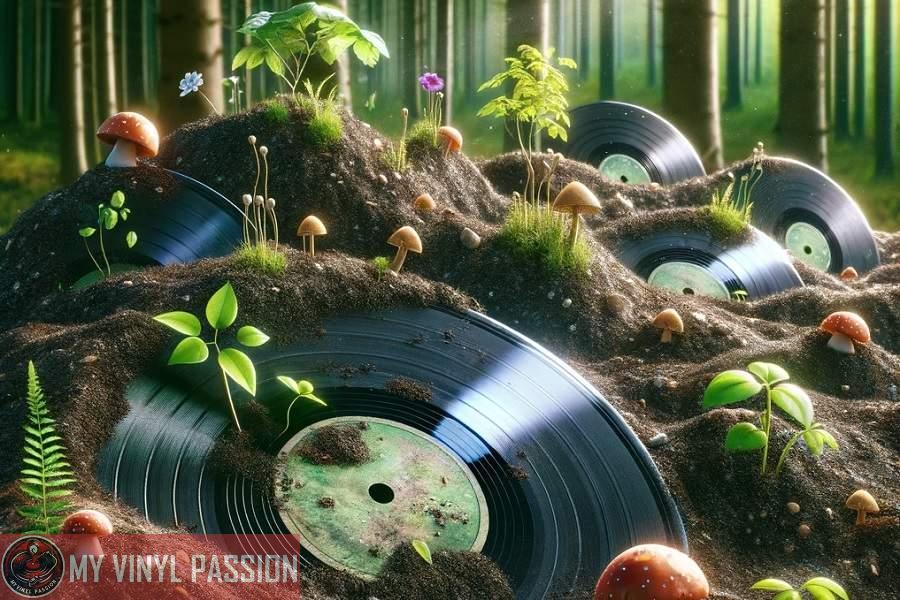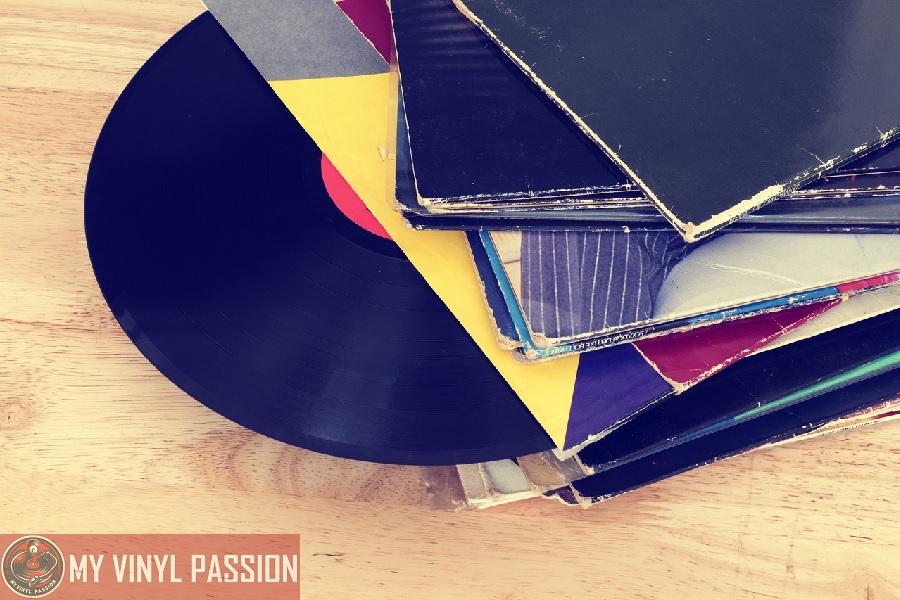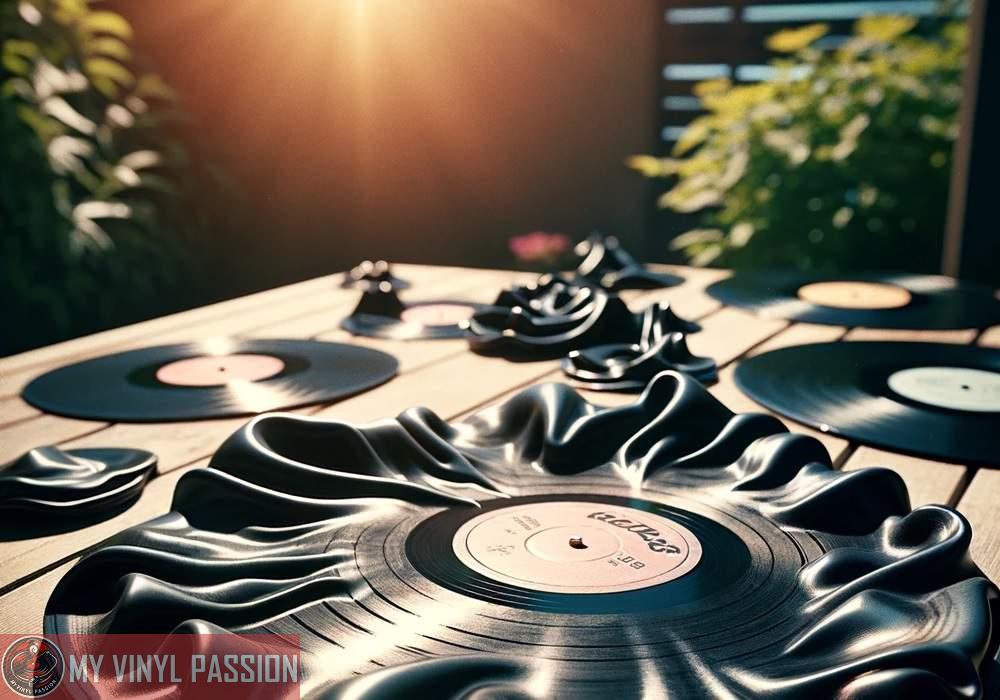Vinyl records have been cherished by music enthusiasts for decades. However, when it comes to environmental concerns, it’s essential to know how long these beloved items take to decompose.
Made from polyvinyl chloride (PVC), a material derived from refined oil, vinyl records are known for their durability and extensive lifespan when cared for properly.
In fact, they can remain intact and playable for several hundred years under the right storage conditions.
In Summary
Vinyl records can last for several hundred years if stored properly
In landfill conditions, decomposition can take up to 1,000 years
Responsible disposal and recycling are essential for reducing environmental impact.
The decomposition rate of vinyl records varies due to different factors including storage conditions, temperature, and humidity. In landfill environments where decomposition might be expected to happen faster, records can actually take up to 1,000 years to decompose, as landfills are designed to prevent waste breakdown.
This slow decomposition process and landfill composition indicate that responsible disposal and recycling of vinyl records are crucial steps for reducing the environmental impact.
Composition of Vinyl Records
Materials and Chemicals
Vinyl records are primarily made of polyvinyl chloride (PVC), a synthetic plastic polymer.
PVC is a durable material that consists of chlorine, carbon, and hydrogen atoms. Its durability contributes to the long-lasting nature of vinyl records. Other components found in vinyl records include stabilizers, plasticizers, and pigments, all of which affect the properties and final quality of the records.
By understanding the composition of vinyl, you can better appreciate the resilience of these music storage media.
Production and Quality
When producing vinyl records, PVC is heated and mixed with other additives to create a malleable compound. This compound is then pressed into the familiar grooved, disc-shaped records you know and love.
The quality of a vinyl record depends on the precise mixture of PVC and additives, as well as the manufacturing process. Factors that can influence the record’s quality include:
- Quality of raw materials: The purity and consistency of the PVC and additives used can impact the overall sound quality and longevity of the record.
- Production process: The manufacturing method and equipment used in creating the records play a significant role in the end product. High standards during the production process will result in higher-quality records.
- Storage conditions: To maintain the integrity of your vinyl records, it’s crucial to store them in a cool, dry environment, away from direct sunlight and excessive heat or humidity.
While the decomposition of vinyl records is incredibly slow, their makeup ensures they can last for centuries if taken care of properly. By familiarizing yourself with the composition and production of vinyl records, you can further appreciate their unique and lasting appeal.
Factors Influencing Decomposition
Environmental Conditions
The decomposition process of vinyl records is greatly impacted by environmental factors such as sunlight, temperature, and humidity.
When vinyl is exposed to sunlight, the PVC material can degrade at a faster rate. Similarly, high temperatures can accelerate decomposition, while extreme cold might slow it down. It is important to note that humidity levels play a crucial role in the process, as moisture can assist in breaking down the PVC material.
Keeping your records in a controlled environment, away from direct sunlight and extreme temperatures, may help prolong their lifespan.
Physical Factors
Aside from environmental conditions, there are other physical factors that contribute to the wear and tear of your vinyl records. The grooves on the records can wear down over time due to repeated use and friction caused by the needle, affecting the sound quality.
Additionally, improper handling, such as touching the grooves with your fingers, can introduce dirt and oils, further accelerating degradation. It is essential to handle your records with care and store them properly, ideally in a vertical position with adequate support, to minimize their physical deterioration.
In summary, the decomposition of vinyl records is influenced by a combination of both environmental and physical factors. Proper care, storage, and handling are crucial in maintaining the integrity of your vinyl records and extending their longevity.
Durability and Lifespan of Vinyl Records
Wear and Tear
Vinyl records can last an impressive 100 years or more under ideal circumstances and with proper care.
However, their durability highly depends on the groove quality and the wear and tear they experience during usage. Each time you play a vinyl record, the stylus has direct contact with its grooves, which could eventually cause noticeable wear and affect the sound quality.
Some factors affecting wear and tear include the quality of your turntable, stylus, and the cleanliness of the records.
Storage and Care
To ensure the extended lifespan of your vinyl records, adequate storage and care are essential. It is crucial to store them in a climate-controlled environment, far from excessive moisture and heat. High humidity levels can cause records to warp, while UV exposure could rapidly degrade the quality of vinyl.
Proper Storage Guidelines:
- Store vinyl records vertically, without stacking them on top of each other.
- Keep them in protective sleeves to prevent dust accumulation.
- Place records away from direct sunlight and maintain a suitable temperature.
Following these storage and care tips will help preserve the durability and quality of your vinyl records, ensuring they last for many years to come.
Impact on the Environment
Landfills and Pollution
Vinyl records are primarily made of PVC (polyvinyl chloride), a type of plastic. When these records end up in landfills, they can contribute to the pollution problem. Over time, as the PVC breaks down, it releases chemicals that can contaminate soil and groundwater.
One of the pressing concerns is the energy-intensive production process involved in creating vinyl records.
Most pressing plants use antiquated methods that consume significant amounts of energy and water, resulting in 12 times the greenhouse emissions of other physical music media. These emissions exacerbate the climate crisis and contribute to air pollution.
Plastic Waste
The resurgence of vinyl records has led to a substantial increase in plastic waste, particularly as the records themselves are wrapped in additional plastic packaging. Since many vinyl enthusiasts consider these records as collectibles, they often remain unrecycled.
You might not be aware that the demand for new records has indirectly contributed to plastic pollution from the production facilities to the final destination.
For example, the Thai Plastic and Chemicals Public Company Limited is a primary PVC supplier for the US record industry, with its headquarters in Bangkok. The long-distance shipping required to transport PVC and the records contributes to greenhouse gas emissions and the overall environmental footprint of vinyl records.
As a vinyl record enthusiast, becoming aware of the environmental impact of your passion is crucial. Consider opting for more eco-friendly options, such as purchasing used records, to help minimize your contribution to the plastic waste problem.
Additionally, supporting greener manufacturing practices and reducing the demand for new vinyl records can contribute to lowering the overall environmental impact of the vinyl revival.
Decomposition Process of Vinyl Records
Biodegradation
Unlike organic materials, vinyl records are not biodegradable as they are composed of polyvinyl chloride (PVC). PVC is a type of plastic that is highly resistant to natural decomposition processes.
In a landfill environment, vinyl records can take up to 1,000 years to decompose. This long decomposition time is attributed to the absence of microorganisms and enzymes that can break down PVC. Consequently, the biodegradation process does not significantly contribute to the decomposition of vinyl records.
Chemical Breakdown
PVC contains chemicals and plasticizers that can undergo degradation over time. However, the chemical breakdown of vinyl records is a slow process, taking centuries to completely break down.
Factors such as temperature, humidity, and UV light exposure may expedite the chemical degradation of vinyl records. For instance, if you expose your vinyl records to direct sunlight or high temperatures, it might increase the likelihood of chemical degradation.
Common chemicals found in vinyl records:
- Ethylene
- Vinyl chloride monomer
- Plasticizers (e.g., phthalates)
It is crucial to understand that the decomposition of vinyl records is a gradual process that occurs over an extended period, measured in centuries rather than decades.
To preserve the integrity of your vinyl records and prolong their lifespan, it is essential to store them properly, away from direct sunlight, high temperatures, and humidity. Following these storage recommendations will help maintain the quality and performance of your vinyl records for many years to come.
Recycling and Responsible Disposal
Recycling Process
Vinyl records are made from polyvinyl chloride (PVC). Although PVC is a synthetic plastic material, the recycling process for vinyl records is not as straightforward as recycling other plastic items.
This is due to the unique composition of vinyl records, which include a PVC base, a label in the center, and a protective layer of lacquer over the grooved surface.
To recycle vinyl records, you should first look for local recycling facilities that accept PVC materials. Unfortunately, there are only a few willing recyclers, making it slightly challenging to dispose of your vinyl records.
The recycling process involves separating the PVC base from the lacquer and label, then melting and reforming the PVC into new products.
Alternatives to Disposal
Instead of disposing of your vinyl records, consider the following alternatives that promote responsible disposal:
- Upcycling: Turn your old vinyl records into creative art pieces, home decor, or even functional items like bowls and clocks.
- Reselling: If your records are in good condition, you can sell them to collectors or vintage stores for profit.
- Donating: Offer your vinyl records to schools, libraries, or local community centers where they can serve as valuable resources for learning and entertainment.
By choosing recycling or alternative methods of disposal, you are contributing to a more sustainable environment for future generations.
Vinyl Records in Popular Culture
Music Enthusiasts
You might have noticed the resurgence of vinyl records in recent years, and it’s not just a fad. Music enthusiasts are loving the unique experience that vinyl offers.
The audio quality that comes with vinyl records is unmatched, often providing a richer and warmer sound compared to digital formats. As you invest in a quality turntable and a collection of your favorite vinyl records, you contribute to this growing trend.
Analog Charm
The vinyl revival goes beyond just audio quality; it’s also about rediscovering the analog charm that was once a staple of music listening.
While digital music streaming might be convenient, you can’t overlook the tactile appeal of handling vinyl records, browsing through cover art, and manually operating a turntable. These tangible aspects not only create a stronger connection with the music but also add an element of ritual to your listening experience.
As vinyl records gain popularity among music enthusiasts and collectors alike, this rejuvenation of analog charm serves as a reminder that, sometimes, older technology still has a place in our modern lives.
So, go ahead and embrace the warm, nostalgic sounds of vinyl records as you explore the richness of their role in popular culture.
Frequently Asked Questions
What is the estimated decomposition time for vinyl records in a landfill?
In a landfill environment, vinyl records can take up to 1,000 years to decompose. This is because landfills are designed to prevent the decomposition of waste by using clay or plastic liners to prevent leachate from seeping into the ground.
Under what conditions might vinyl records decay more quickly?
Vinyl records may decompose more quickly under conditions of increased exposure to sunlight, heat, and moisture. These factors can cause the material to become brittle and break apart over time. However, the exact rate of decomposition under these conditions is still unknown and may vary depending on the specific environmental factors at play.
Are there any environmental factors that can accelerate the degradation of vinyl records?
Yes, environmental factors such as exposure to direct sunlight, high temperatures, and humidity can accelerate the degradation of vinyl records. These factors can lead to warping, delamination, and eventual disintegration of the record’s material.
What are some common factors that contribute to the wear and tear of vinyl records?
Common factors that contribute to the wear and tear of vinyl records include improper handling, poor storage conditions, dust, and the use of low-quality or damaged playback equipment. To prolong the life of your vinyl records, you should handle them with care, store them vertically in a cool, dry environment, and use proper playback equipment.
Can the quality of a vinyl record affect its overall longevity and decomposition rate?
Yes, the quality of a vinyl record can affect its overall longevity and decomposition rate. Higher-quality records are typically made from denser, more resilient materials, which may extend their lifespan and help them resist decomposition more effectively than lower-quality records made from thinner, more fragile materials.
How does the decomposition time of vinyl records compare to other common materials?
The decomposition time of vinyl records is significantly longer than that of many other common materials. For example, paper products can decompose in a matter of weeks or months, while organic materials such as food waste typically break down within a few years. On the other hand, plastics such as vinyl records can take centuries or even millennia to decompose, contributing to long-lasting environmental pollution.





